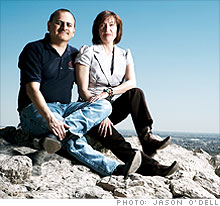Business boot camp
FSB's makeover squad helps a shoemaking couple chart a growth plan.
 |
| Joey and Priscilla Sanchez, in El Paso, have sold their boots to Cher and KISS. |
EL PASO (FORTUNE Small Business) -- In the cutting room of a footwear company called Caboots, Arturo Estrada, a 70-year-old master craftsman, labors over a swatch of calfskin leather. As Estrada incises a delicate rose into the boot's vamp (the piece that fits over the top of the foot), Caboots CEO Joey Sanchez looks on with pride.
"Arturo has been doing this for decades," says Sanchez, 42, who runs the El Paso-based firm with his wife, Priscilla, 43.
Sanchez is familiar with the artisan's tradition. As a kid, he scampered around the factory of his parents' custom-boot company (which Caboots acquired this year after Sanchez's parents retired). The family shoemaking legacy dates back to Joey's great-grandfather, a Mexican immigrant who did repair work for major companies such as Justin Boots.
Today Joey and Priscilla don't see their boots strutting through music videos, but they have appeared in movies such as the sequels to Pirates of the Caribbean. Sales rose from $160,000 in 2000 to $2.3 million in 2006, thanks mostly to Caboots' Internet success (e-commerce now makes up almost all of its revenues).
But 2007 sales dipped to $1.5 million. The Sanchezes blame the decline partly on a flood that damaged the firm's office and sapped morale.
But they also suspect that product variety - some 500 boots are listed on the firm's website - is limiting growth.
"We're spread out like an octopus," says Joey. "We spend so much time on production that we can't focus on a business strategy."
The Sanchezes want to hire operations managers, but they worry about cash flow. Plans to find investors, boost marketing, and improve the website have remained just that - vague plans. Which is why Joey wrote to ask FSB to help him spur change at Caboots.
When the first consultant enlisted by FSB, David Thomson, a business advisor and the author of Blueprint to a Billion (see our May 2006 cover story), arrives at Caboots headquarters, Joey and Priscilla bound out of the stucco building in jeans and boots.
"We're not quite a billion-dollar business," begins Joey, but Thomson, 53, who owns Blueprint Growth Institute in Overland Park, Kan., cuts in: "The same essentials apply to you."
As the Sanchezes lead him into the Caboots warehouse, Thomson's animated voice fights with the sound of sewing machines. He's amazed by the huge variety of boots lining the shelves.
"Those styles" - he points to a pair of $80 storm trooper shoes and a pair of $1,000 custom alligator boots - "are quite different from each other."
Cradling a storm trooper boot, Joey says, "These babies paid for this building!"
The owners and Thomson sit down in the lobby, which doubles as a showroom filled with boots. Thomson whips out a stack of paper and starts scribbling.
"Caboots is so diverse, I'm having difficulty understanding it," he says.
He asks the Sanchezes to break down their inventory, which ranges from one-of-a-kind cowboy boots to clown shoes, into four distinct product lines. The couple settles on custom-made boots, boots crafted from templates, custom-made costume boots - such as those seen in movies - and costume boots formed from templates.
When Priscilla says she wants to hire managers for each line, Thomson agrees.
"But we don't have the money," she notes. "For the first time, we need an investor."
"Before seeking investors, you need a simpler story to tell," says Thomson. Is Caboots about making top-quality cowboy boots or creating finishing touches for Halloween getups?
To find out, Thomson asks the couple which lines are growing. It's clear that they haven't mulled the question before. So he has them split sales by product and then rank each line's growth potential. After a bit of quibbling, Joey and Priscilla create a list.
Thomson also pushes them to describe each line's benefits. The Sanchezes say customized boots (both costume and noncostume) are their flagship products. But their less expensive, template-made offerings could drive growth by selling in greater quantities than the costlier products. Thomson advises the Sanchezes to keep all the lines, but tie the company's image and story to the pricier, custom-made boots.
Next Thomson asks the Sanchezes to identify their "marquee customers" - those who are the business's elite clientele.
"We have more than 100 who buy from us repeatedly," says Joey. "They're doctors, lawyers, CEOs."
When Thomson hears this, he tells the owners to use these regulars as the faces of the business - put them in advertisements, hold social events for them, ask them to form a customer advisory council.
"Eventually," he says, "that could become an advisory board - then a board of directors, which every business needs if it wants to grow."
Such a board could offer Caboots objective opinions, valuable connections, and varied expertise. Thomson isn't sure the firm needs venture capital, but if the owners choose that route, he suggests they turn to their top clients for funding.
Phil Morabito, CEO of Pierpont Communications, one of Houston's largest marketing and PR agencies, arrives the next day. During a factory tour, Joey leads Morabito into a room where the boots' uppers are soaked in hot water and hammered onto lasts, or pre-sized soles used for fitting. The entire process can take more than a month, says Joey.
"This is wonderful," notes Morabito. "You must show this to people in your marketing campaigns and at trade show demonstrations."
When he asks what kind of marketing Caboots does, Joey says the firm's efforts are mainly Internet-based, with the exception of a recent direct-mail campaign that pulled in several new customers. Joey admits that he has no formal marketing plan.
"First," says Morabito, "you need help."
He advises Caboots to pluck a marketing coordinator from the University of Texas at El Paso, and then have the new hire execute regular campaigns to maintain communication with customers.
"Send them postcards four times a year and e-mails four other times," he says. "You'll see bumps in business." He also says that the coordinator should oversee promotions, which should occur randomly, "so customers don't anticipate a pattern and wait for a sale to buy boots."
When Morabito, 50, hears about Caboots' star-studded past, he says the firm is not tapping its publicity potential. "Outsource PR to a qualified publicist," he says.
Morabito brainstorms stories that will help Caboots make news. The firm could try to create trends, such as wedding boots, he suggests. "Or send boots to the presidential candidates - they're for kicking butt, right?" When Morabito dreams up an "iBoot" for Steve Jobs, Joey jumps across the table and gives him a high five.
-
The Cheesecake Factory created smaller portions to survive the downturn. Play
-
A breeder of award-winning marijuana seeds is following the money and heading to the U.S. More
-
Most small businesses die within five years, but Amish businesses have a survival rate north of 90%. More
-
The 10 most popular franchise brands over the past decade -- and their failure rates. More
-
These firms are the last left in America making iconic products now in their twilight. More












